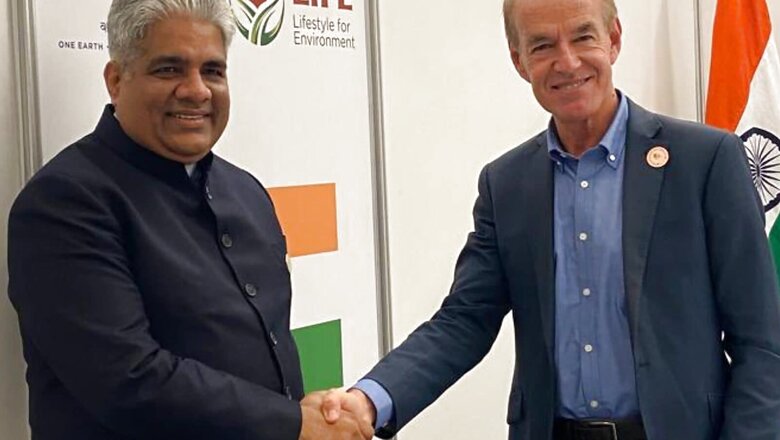
views
As many as 196 countries have agreed to a historic deal to protect millions of plants, animals, and bird species from extinction. The major biodiversity pact that has been in the making for over four years will now guide global conservation efforts over the next 10 years to halt and reverse the loss by 2030.
The Kunming-Montreal Global Biodiversity Framework — as the treaty is called — was finalised on the last day of the United Nations (UN) Biodiversity Summit (COP15) that began in Montreal, Canada on December 9. The new agreement has locked in four major goals to protect these imperiled species, and finalised 23 targets to achieve the goals which would eventually help the world “live in harmony with nature by 2050”.
THE MONTREAL TREATY
The agreement which is also being compared to the landmark Paris Climate Accord of 2015 will guide the 196 countries to transform their economic, social and financial models so that the trends that have exacerbated biodiversity loss will stabilise in the next 10 years. Starting next year, governments, including India, will work out their conservation plans to put what has been agreed upon into action.
????#BreakingNews: Nations Adopt 4 Goals, 23 Targets for 2030 In Landmark UN Biodiversity AgreementBy 2030: Protect 30% of ????'s lands, ????, coastal areas, inland waters; Cut food waste in half’; More
????➡️ https://t.co/wzlD2ivPKD#COP15 #COP15Announcement #GBFAdoption #post2020???? pic.twitter.com/d4gQgJ4zIk
— UN Biodiversity (@UNBiodiversity) December 19, 2022
A major commitment that emerged from the UN-backed conference, co-hosted by China and Canada, has been to restore at least 30% of the world’s degraded ecosystems on land and sea this decade. Governments have also committed to realise the 30-by-30 goal to conserve and manage 30% of world’s lands, inland waters, coastal areas and oceans by 2030.
The pact, though not legally binding, also calls for reducing the loss of areas of high biodiversity importance to near-zero, prevent the introduction of priority invasive alien species and reduce by at least half the introduction and establishment of other known or potential invasive alien species.
Countries have also agreed to a target of reducing the risk posed by pesticides and highly hazardous chemicals to almost half, while also phasing out subsidies that harm biodiversity by at least $500 billion per year. All this will have to be achieved by 2030. Critically, big business and investors would need to report on their actions that could have a potential impact on biodiversity.
THE FUNDING
Much to the dismay of African countries, no separate biodiversity fund has been created to help developing countries pay for the new targets. But the treaty has called for mobilizing at least $200 billion per year in domestic and international biodiversity-related funding from all sources – public and private by 2030.
The rich and developed nations have agreed to put on table at least $20 billion per year by 2025 and $30 billion per year by 2030 to ensure adequate financial flows to developing countries.
WHY THIS DEAL IS IMPORTANT
With global wildlife populations shrinking at an astonishing pace over the past few decades, the Montreal deal was considered as possibly the last big chance to avert some of this damage. Over one million species are currently at risk of extinction, and others have already been lost.
Not just climate change, but large-scale conversion of land and seas for development purposes, direct exploitation of organisms, pollution and invasion of alien species have been a huge driver for disappearance of the species.
Addressing the stocktaking plenary at the UN Biodiversity Conference, COP15 in Montreal, Canada https://t.co/A1WgIm69UY— Bhupender Yadav (@byadavbjp) December 17, 2022
WHAT INDIA HAS SAID SO FAR
India had fully committed itself to working closely with all parties to bring out an ambitious and realistic Global Biodiversity Framework, with emphasis on “common but differentiated responsibilities.”
Addressing the Stock taking Plenary on the penultimate day of the summit at Montreal, Environment minister Bhupender Yadav had reiterated that conservation of biodiversity must also be based on these principles. He also discussed concerns regarding the use of pesticides for agriculture, and said that “prescribing numerical targets in pesticide reductions would be unnecessary”. And, highlighted that it must be left to countries to decide, based on national circumstances, priorities and capabilities, especially “when food security is of paramount importance for developing countries.”
Another major concern had been finance. India had made clear that the successful implementation of the framework would squarely depend on the ways and means put in place for an equally ambitious Resource Mobilization Mechanism (finance). It had also called for creating a new and dedicated mechanism for the provision of financial resources to developing-country parties.
Read all the Latest India News here




















Comments
0 comment